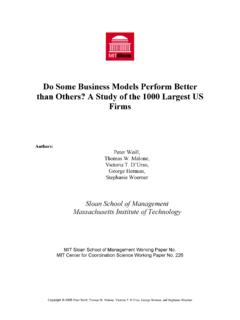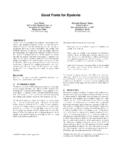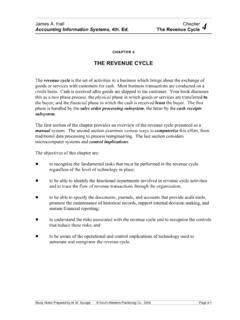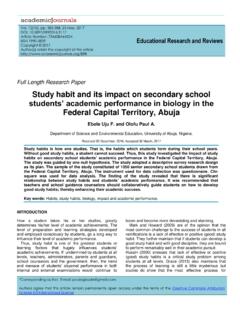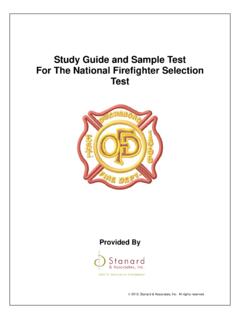Transcription of STUDY HABITS AND ACADEMIC PERFORMANCE OF …
1 Research in Pedagogy, Vol. 7, Issue 2 (2017), pp. 283-297 _____ 283 Abisola Oladeni Sakirudeen Original scientific paper Dr. Kudirat Bimbo Sanni UDK: Department of Educational Foundations, Guidance and DOI: Counselling Faculty of EducationUniversity of Creative Commons Uyo, Uyo Akwa Ibom State Attribution International License ======================================== ====================================== STUDY HABITS AND ACADEMIC PERFORMANCE OF SECONDARY SCHOOL STUDENTS IN MATHEMATIC: A CASE STUDY OF SELECTED SECONDARY SCHOOLS IN UYO LOCAL EDUCATION COUNCIL Abstract: The STUDY examined STUDY HABITS and ACADEMIC PERFORMANCE of secondary school students in Mathematics.
2 A case STUDY of selected secondary schools in Uyo Local Education Council. The main purpose of the STUDY was to investigate the relationship between STUDY HABITS and ACADEMIC PERFORMANCE of secondary school students in Mathematics. To carry out this STUDY , three research questions and three null hypotheses were raised to guide the STUDY . The population of 1128 Senior Secondary School Two (SS2) students with a sample size of 200 respondents was selectedfrom 5 public secondary schools for the STUDY using simple random sampling technique. A structured questionnaire was used to gather data for the STUDY , which comprises of two sections (A and B), section A comprise of 15 items while section B, comprise of 30 achievement test on mathematics.
3 The reliability coefficient of was obtained using spearman Brown formula. Data collected was analyzed using Pearson Product Moment Correlation Co-efficient (PPMC) and tested at level of significance. However, the results revealed that there is significance relationship between note taking, students use of library, time allocation for STUDY and students ACADEMIC PERFORMANCE in mathematics. Based on the result of the findings, it was recommended that group guidance should be organized in schools by professional counsellors in order to create awareness on how students can develop effective STUDY HABITS which could lead to good ACADEMIC PERFORMANCE in mathematics and a functional school library should be mounted in all the secondary schools in Uyo Local Government Area of AkwaIbom State, Nigeria.
4 Key words: Mathematics, Students ACADEMIC PERFORMANCE and STUDY HABITS . 1. Introduction Mathematics is a methodical application of matter. It is so said because the subject makes a man methodical or systematic. Mathematics makes our life orderly and prevents chaos. Certain qualities that are nurtured by mathematics are power of reasoning, creativity, abstract or spatial thinking, critical thinking, problem-solving ability and even effective communication skills (Muraina, 2013). Mathematics is the cradle of all creations, without which the world cannot move an inch. Be it a cook or a farmer, a carpenter or a mechanic, a shopkeeper or a doctor, an engineer or a scientist, a musician or a magician, everyone needs mathematics in their day-to-day life.
5 Even Research in Pedagogy, Vol. 7, Issue 2 (2017), pp. 283-297 _____ 284 insects use mathematics in their everyday life for existence. There are countless examples of mathematical patterns in nature's fabric. Anyone can be a mathematician if one is given proper guidance and training in the formative period of one's life. A good curriculum of mathematics is helpful in effective teaching and learning of the subject (Abba, 2007). According to Abba, (2007) observed that mathematics puzzles and riddles encourage and attract an alert and open-minded attitude among youngsters and help them develop clarity in their thinking.
6 However, emphasis should be laid on development of clear concept in mathematics in a child, right from the primary classes. Another very effective means of spreading the knowledge of mathematics among children is through peer-teaching and encouraging a good STUDY HABITS among students. Once a child has learned a concept from his teacher, the latter should ask him to explain the same to fellow students. Moreover, in the process all the children will be able to express their doubts on the topic and clear them through discussions in a group (Aremu, 2001).
7 The problems associated with STUDY HABITS might have a major effect on a student s ACADEMIC performances, it is believed that everyone has a different STUDY habit and it is important to find out the best personal way to STUDY . Studying with friends has a long way to go in student s STUDY HABITS , it has a positive influence in which they discuss what have been read together but also has a negative effect in which they might not read but find themselves discussing throughout the stipulated time for reading which boils down to time wastage. According to Hills (2000), a very good and conducive learning environment encourages students STUDY habit and might have positive impact on their ACADEMIC performances but students reading in an unfavorable environment might find it difficult to STUDY which may affect their ACADEMIC achievements.
8 Students with financial constraints might also find it difficult to perform excellently well in their academics. However, students STUDY habit should contribute to their ACADEMIC PERFORMANCE . Some students do not attend classes, do not take down notes, do not do their assignments, do not read their books or make use of the library. These attitudes may negatively affect their ACADEMIC performances especially in mathematics. This STUDY intended to identify various STUDY HABITS used by the students and the relationship with their ACADEMIC performances. The distressing phenomena: scholastic underperformance and failure have caused serious concern to educationists, guidance counsellors and educational planners for several decades as this amount to colossal wastage of resources available for education.
9 This necessitates serious probe into the causes that underlie and factors that lead to underachievement and failure, so that means could be devised to grapple with this enormous problems. This is why Aremu (2001) opined that the more mathematical we are in our approach, the more successful we will be. Mathematics offers rationality to our thoughts. It is a tool in our hands to make our life simpler and easier. In support of these assertions, Abba (2007) posited that student should realize and appreciate the beauty of the subject and embrace it with all our heart.
10 It is a talent which should be compulsorily honoured by all in every walk of life. The STUDY HABITS of students vary from one student to the other and from one place to another. It is an important aspect of learning because students achievement in schools depends greatly on their STUDY HABITS . The low understanding level in mathematics has become great concern for our country, parents, educationists and government. The researchers and educationists have made frantic efforts to find out the causes of low achievement in the subject (Muraina, 2013). In spite of all these efforts the problems still persist.











